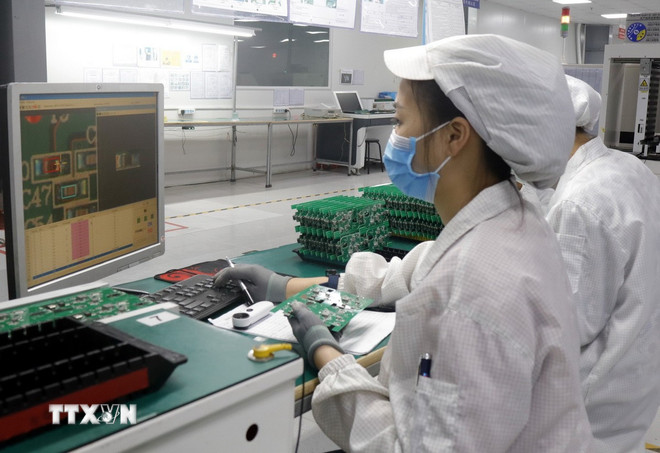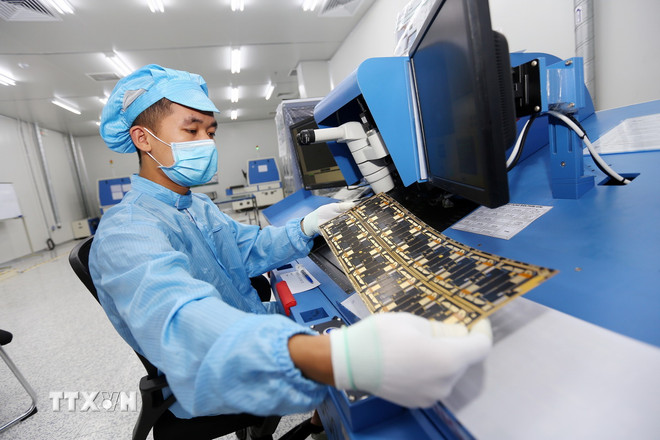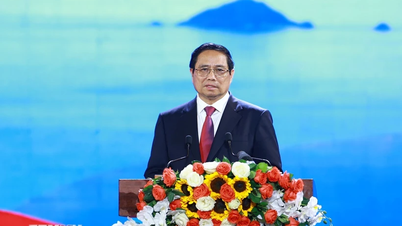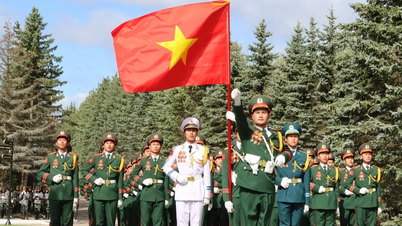Aiming to achieve the goal of 2030, Hanoi National University will train about 20,000 students in the field of semiconductor chips, starting from 2025. Besides the University of Technology which has trained in this field since previous years, two other member schools of Hanoi National University also started enrolling students in the semiconductor technology training program, which are the University of Natural Sciences and the Vietnam-Japan University.
In 2025, Hanoi National University assigned the University of Natural Sciences to open a bachelor's program in semiconductor technology, enrolling the first class with 140 students.
The Semiconductor Technology Department of the University of Natural Sciences will consider admission based on the high school graduation exam scores in 7 groups: A00 (Math, Physics, Chemistry), A01 (Math, Physics, English), A02 (Math, Physics, Biology), B00 (Math, Chemistry, Biology), C01 (Math, Physics, Literature), C02 (Math, Chemistry, Literature) and D07 (Math, Chemistry, English).
In addition, the school plans to use a number of other methods, including: direct admission and priority admission; based on the HSA assessment test scores of Hanoi National University; considering international certificates (SAT, A-Level, ACT); combining graduation exam scores and international foreign language certificates.
Associate Professor, Dr. Nguyen Anh Tuan, Head of the Department of Training and Student Affairs, Hanoi National University, said that Hanoi National University assigned the Faculty of Physics, University of Natural Sciences to open a bachelor's program in semiconductor technology not only to meet the urgent demand for human resources, but also to contribute to enhancing Vietnam's position in the global supply chain. This is an opportunity for pioneering universities to train a team of semiconductor experts, serving the country's development in the digital age.
With the goal of fully equipping students with basic and specialized knowledge of semiconductor technology, after graduation, Hanoi National University students can confidently apply it in practice, meeting the demand for high-quality human resources of the 4.0 industrial revolution, creative startups and international integration.
Professor, Dr. Nguyen The Toan, Head of the Physics Department, University of Science, Vietnam National University, Hanoi, said that students studying this program will be well-trained, have a solid theoretical knowledge foundation and proficient practical skills to work in important positions in the semiconductor industry such as: manufacturing; design, packaging and calibration of integrated semiconductor components (IC); development of new materials to improve the quality of components and equipment.

They are also able to participate in research and teaching assistantship at research facilities and higher education institutions; can continue to study and research at higher levels in the field of semiconductor technology and related fields; highly adaptable to the demands of the labor market.
In addition to professional training, students are trained in soft skills, communication, management, teamwork and good foreign language skills to work in a multidisciplinary, multicultural and multinational environment.
The program is built on the experience and achievements of the Materials Science industry as well as the joint training program with foreign semiconductor technology graduate programs such as the NYCU-Taiwan (China) joint master's program in Semiconductor Technology from 2020.
As a leading research university, the Faculty of Physics of the University of Science is a key research unit with the only clean room infrastructure in Vietnam National University, Hanoi, suitable for the fabrication of semiconductor materials and components.
Graduates have the opportunity to work at leading companies in chip and semiconductor manufacturing such as Micron, Intel, Foxconn, Samsung Electronics, LG Display, Canon, Nissan or high-tech corporations such as FPT, Viettel, VNPT...
In addition, students have many opportunities to access scholarships to continue their master's and doctoral studies at the world's leading universities in Japan, Korea, Taiwan (China), Singapore, the United States, etc.
Vietnam-Japan University - Vietnam National University, Hanoi also plans to enroll the first course of the semiconductor chip technology training program this year, with a target of 100 students.
The school has officially established a semiconductor chip technology training program with the goal of providing a team of high-quality engineers to meet the human resource needs of the domestic and international semiconductor industry. The program is designed according to technology trends in the semiconductor field, combining theoretical and practical foundations.
In addition, the school focuses on cooperation with universities and businesses in Japan, creating favorable conditions for students in internships and career development.

The implementation of the semiconductor chip technology training program at the school is a strategic step to improve human resource capacity for the semiconductor industry in Vietnam. The program is expected to contribute to the development of quality human resources for the semiconductor industry in the region.
This year, the University of Engineering and Technology - Vietnam National University, Hanoi opened 4 new majors, specializing in information technology and semiconductor microchips. The training program of the Electronic and Telecommunication Engineering Technology major with a focus on microchip design is built on the foundation of the Electronic and Telecommunication Engineering Technology major, both of which have the same admission code.
Candidates who register for the Electronics and Telecommunications Engineering Technology major when admitted will be able to choose to major in Electronics and Telecommunications Engineering Technology or focus on microchip design. The total quota for this major is 480 students. New students of the Electronics and Telecommunications Engineering Technology major with a focus on microchip design will be able to participate in semiconductor research and design groups from the first years.
With its strengths in physics, engineering and infrastructure, the University of Technology has opened a completely new major, Materials Technology (Materials Technology and Microelectronics program), to provide students with knowledge related to materials and manufacturing technology.
This program is expected to enroll 120 students, train for 4.5 years and graduate with an engineering degree. Graduates of Materials Technology can enter the labor market in the fields of materials, manufacturing, and packaging in semiconductors. These are the three main job positions in this industry./.
Source: https://www.vietnamplus.vn/them-cac-truong-thanh-vien-cua-dai-hoc-quoc-gia-ha-noi-dao-tao-cong-nghe-ban-dan-post1036341.vnp

























![[Photo] Thousands of Buddhists wait to worship Buddha's relics in Binh Chanh district](https://vphoto.vietnam.vn/thumb/1200x675/vietnam/resource/IMAGE/2025/5/3/e25a3fc76a6b41a5ac5ddb93627f4a7a)


































































Comment (0)